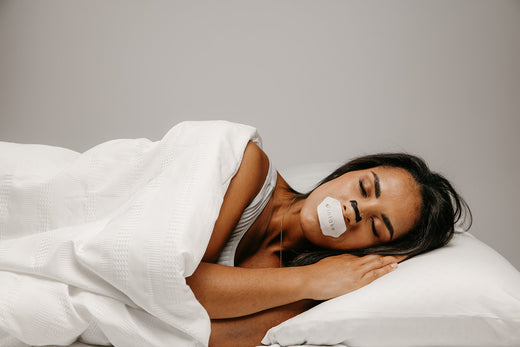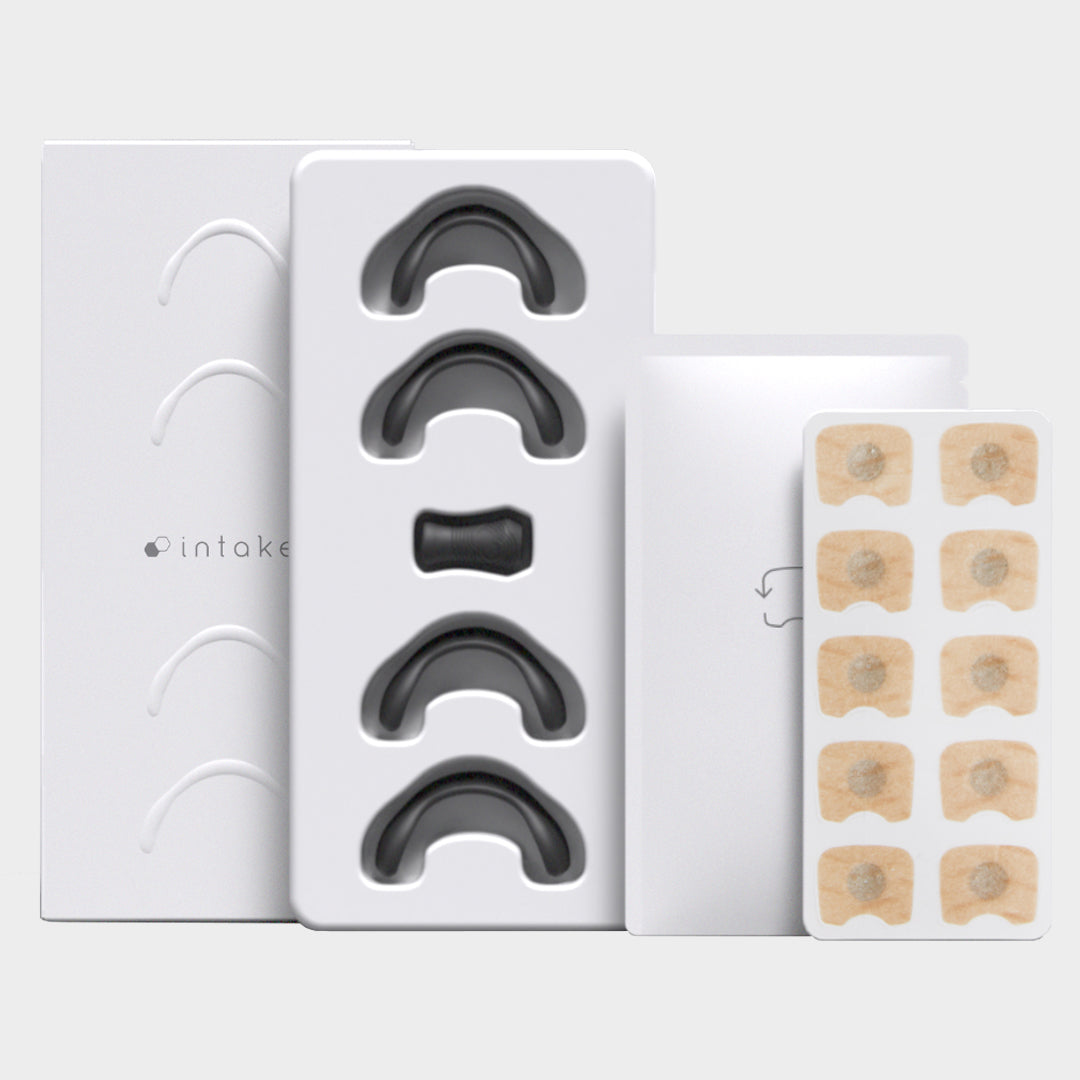Can mouth tape for Sleep be Dangerous? Despite the glowing testimonials, mouth taping carries several risks that cannot be ignored:
- Breathing Obstruction: For those with underlying conditions like sleep apnea or nasal obstructions, forcing nasal breathing could exacerbate problems and lead to dangerous complications.
- Anxiety and Discomfort: Many people report feeling anxious or claustrophobic when their mouth is taped shut, disrupting sleep instead of improving it.
- Skin Irritation: Adhesives on tapes, even hypoallergenic ones, can cause rashes or discomfort, particularly for individuals with sensitive skin.
- Unaddressed Health Issues: Mouth breathing often points to an underlying issue, such as nasal polyps, allergies, or a deviated septum, which mouth taping doesn’t address and might worsen by masking the symptoms.
Who Should Avoid Mouth Tape?
Certain groups should approach mouth taping with caution or avoid it altogether:
- Individuals with severe sleep apnea or breathing disorders.
- People with nasal obstructions like polyps or chronic congestion.
- Those experiencing cold or sinus infections.
- Anyone with sensitive or damaged skin around the mouth.
- Children, whose growth and facial development could be affected by improper breathing practices.
Potential Benefits of Mouth Tape
The theory behind mouth taping suggests it can counteract the negative effects of mouth breathing, such as:
- Bad Breath: Mouth breathing is linked to dry mouth, which can lead to halitosis and poor oral health.
- Dry Mouth and Cavities: Reduced saliva production at night can increase the risk of gum disease and cavities.
- Improved Sleep: Anecdotal evidence suggests that promoting nasal breathing can lead to more restful sleep.
- Snoring Reduction: Small studies suggest it may reduce snoring in people with mild sleep apnea or those who snore due to positional sleep habits.
Magnetic Nasal Dilators as a Safer Alternatives?
If the risks of mouth taping seem too high, magnetic nasal dilators provide a safe and effective alternative. These non-invasive devices gently open the nasal passages, improving airflow without obstructing the mouth.
Ideal for anyone seeking better nasal breathing, including snorers, allergy sufferers, or athletes. Unlike mouth taping, they are non-invasive, hypoallergenic, and comfortable, providing instant relief for snoring, congestion, or mild sleep apnea.
How To Cut Out Your Own Mouth Tape
To try mouth taping, start by cutting a strip of medical-grade, hypoallergenic tape that’s approximately 1 to 2 inches long and an inch wide. Paper tape 1-2 inches and less than an inch as it will stimulate the nerves in the lips and go back to the nose via the V2 and V3 of the 5th cranial nerve - I see this on rhinomanometry tracings.
Placing the tape vertically across the center of your lips while leaving enough space for some airflow. Ensure the tape is breathable and gentle on the skin to prevent discomfort or panic during the night. Be sure to do the straw sip test to be sure the mouth can open in an emergency.
What Tape Should I Use for Mouth Taping?
When choosing tape for mouth taping, it’s essential to prioritize safety and comfort. Use medical-grade, hypoallergenic tape designed for skin, such as surgical tape or specially designed mouth strips. I don’t recommend surgical tape due to skin issues and reactions I have seen when using tape for IVs and ET tubes. We used paper tape.
Avoid household tapes like duct tape, paint tape, masking tape, or packing tape, as they can cause skin damage and restrict airflow. Always test the tape on your skin first to ensure compatibility before using it overnight.
We also carry a limited supply of Intake Mouth Tape
Problems with mouth breathing
The theory behind mouth taping also goes that by breathing through your nose, you can avoid negative side effects linked to mouth breathing while sleeping, including:
- Bad breath
- Daytime fatigue or tiredness
- Dry mouth
- Poor oral health, including cavities and gum disease
- Reduced mental skills, especially working memory
- Symptoms related to attention deficit hyperactivity disorder (ADHD)
- Sleep disordered breathing, including sleep apnea
- Slowed growth in children
- Children who mouth breathe can develop “mouth breathing face” This is adenoid face – a narrowed face with a receding chin and jaw.
So far, there have been very few, if any, scientific
Benefits of nose breathing
Mouth taping does force you to breathe through your nose. Breathing through your nose has many benefits that mouth breathing doesn’t, including:
- Controlling the temperature of the air you breathe, so the air that reaches your lungs is not too cold or too warm
- Filtering allergens, debris, or toxins from the air before they reach your lungs
- Making the air you breathe humid, keeping your mouth and throat moist
- Reduce the risk factors of heart disease
- Improve mental health
- Improve cognition
- Assist in nitric oxide production
-
Reduce blood pressure
Magnetic Nasal Dilators for Sleep Apnea
Magnetic nasal dilators can be a helpful tool for those with mild sleep apnea by improving nasal airflow and reducing airway resistance. By gently opening the nasal passages, they address restricted breathing, a common contributor to sleep disruptions and snoring, without invasive procedures.
For individuals with mild or positional sleep apnea, dilators enhance oxygen intake, promoting restful sleep. While not a replacement for CPAP therapy in severe cases, they can be part of a broader management plan, offering a simple, comfortable, and non-invasive solution to support better breathing and overall sleep quality.
Can Mouth Tape Be Dangerous
Mouth taping, a practice where adhesive tape is used to seal the mouth during sleep to encourage nasal breathing, can have potential benefits but also carries several risks, especially for individuals with underlying health conditions. The primary concern arises in those with undiagnosed or untreated obstructive sleep apnea (OSA), as mouth taping can exacerbate oxygen deprivation by forcing reliance on nasal breathing, which may not be adequate during airway obstruction events. Individuals with nasal blockages, such as severe congestion, nasal polyps, or a deviated septum, may experience significant discomfort or even dangerous reductions in airflow when their ability to mouth-breathe is restricted. Additionally, taping can lead to skin irritation, rashes, or allergic reactions to the adhesive, and the sensation of restricted airflow can induce feelings of panic or anxiety in some individuals.
For those who are unable to clear their nasal passages effectively, mouth taping can increase the risk of suffocation, especially in children or people with limited airway awareness. The practice may also dry out nasal passages, leading to discomfort, nosebleeds, or increased vulnerability to infections. In rare cases, improperly applied tape may dislodge during sleep and present a choking hazard. Furthermore, if mouth taping is used without addressing the root causes of mouth breathing, such as enlarged tonsils, nasal valve collapse, or habitual open-mouth breathing, it may only mask symptoms without providing a lasting solution. Even if sleep apnea and other issues are ruled out, and the snoring continues, mouth taping is still not recommended, but instead a nasal dilator, preferably an external type like Intake.
I also recommend positional sleeping that can reduce nasal resistance such as the head up at 30 degrees, and side sleeping on the obstructed side towards the ceiling to enhance clearing. It should be noted that sleeping on the right side may increase resistance in the airways and asthma due to increase of vagal tone that activates the parasympathetic nervous system, and may make heartburn worse. For shortness of breath, sleeping in the stomach will reduce the pressure on the chest and lungs.
Given these risks, and the limited scientific research, mouth taping should not be undertaken without a thorough evaluation by a healthcare provider, especially for individuals with respiratory or sleep disorders, cardiac issues, or pregnancy. If recommended by a professional, medical-grade tape designed for sleep and a clear nasal passage should be used to reduce potential complications.





